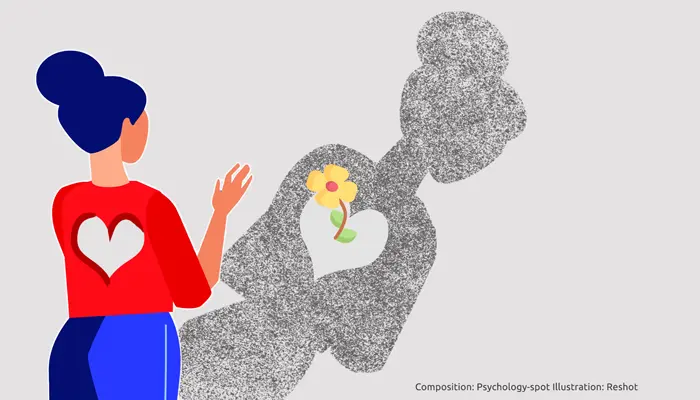
Sometimes we become our worst enemy. Sometimes, we are our harshest critics and even our most ruthless exploiters. Sometimes we overload ourselves with too many obligations. We demand too much of ourselves. We are too hard on ourselves. And that just doesn’t help.
Self-exploitation leading to burnout
We have grown up in a society that pushes us towards competition and prints the idea of success on us. As a result, it is not surprising that we pretend more and more from ourselves. That we push ourselves to the edge of our strength, physical and mental. However, as philosopher Byung-Chul Han warns: when “overwork and overachievement become more acute, they become self-exploitation.”
And we cannot be happy, feel fulfilled or experience the well-being we deserve if we constantly exploit ourselves. If we reproach ourselves and treat ourselves badly. If we continually punish ourselves for not having been strong enough or for not having gone far enough.
In fact, Byung-Chul Han thinks that what makes us sick is not excess of responsibility or even initiative, but rather the performance imperative that we impose on ourselves. When we force ourselves to perform at any cost, we begin to compete with ourselves. At that point, “External coercion is replaced by self-coercion masquerading as freedom.”
When we internalize irrational social expectations, such as the imperative to be able to do everything, we harm ourselves. In the long run, it is impossible to endure that psychological pressure for a long time. We can feel like the world is pulling us in a thousand different directions, so it’s no wonder we end up frustrated.
Then we become too hard on ourselves. We punish ourselves for not using our time efficiently. We berate ourselves for not being where we should be. We beat ourselves up for what we haven’t achieved instead of rewarding ourselves for what we have done well. That should change.
The key is self-compassion, not self-esteem
In 2016, two psychologists from the University of California conducted a very interesting experiment on the benefits of treating ourselves in a compassionate and kind way. They asked a group of people to remember a time when they did something they considered wrong and, as a result, felt guilt, remorse, and regret.
Most recalled a betrayal, an inappropriate behavior when they were students, an act of dishonesty, having betrayed someone’s trust or hurt the feelings of a significant person.
One group was asked to write a paragraph for themselves expressing kindness and understanding regarding the transgression. Other people were told to write about their positive qualities to increase their self-esteem. The psychologists then assessed their motivation to change, their desire to make amends, and their commitment to not repeat the transgression in the future.
They found that those who had experienced compassion and treated themselves more kindly were more motivated to fix their mistake and committed to not doing it again than those who were simply reminded of their positive qualities.
That means that treating ourselves in a kind and compassionate way helps us overcome failures and setbacks, but it doesn’t lead us into self-indulgence or make us mediocre. On the contrary, it stimulates a growth mindset as it encourages us to try harder in the future while remaining optimistic and confident.
How can we treat ourselves kinder?
Basically, every time we push ourselves harder and then recriminate and blame ourselves, it’s like we’re running a marathon without rest and, instead of encouraging ourselves to keep running, we continually tell ourselves that we’re not fast, strong or resilient enough. In this way, it is not strange that psychological exhaustion is added to physical fatigue.
Therefore, instead of waiting for validation from others and seeking pats on the back from those around us, we must learn to be kind to ourselves. Simply because we are doing the best we can with the tools we have at our disposal.
Instead of trying to impress others – at any cost – we should pay more attention to our needs. Maybe we need to rest more. Sleeping more. Disconnect more. Enjoy more. Get to know ourselves more…
Instead of becoming our fiercest critic, we should practice more self-compassion, which is not about becoming overly self-indulgent, but rather giving ourselves that dose of love, support and understanding that we all need to move forward and that we sometimes look for outside of ourselves.
Therefore, I hope that you manage to be kind to yourself, especially on the hardest days. I hope you follow your dreams, but also take a break. I hope you treat yourself with compassion when you make mistakes and encourage yourself when you fall down. I hope you pay attention to what your body and mind need so you can satisfy them.
I hope you see that you are capable of doing much more than you think, but also that you understand that just because you can run marathons – literal or metaphorical – doesn’t mean you don’t need to take care of and pamper yourself. Pay more attention to yourself. Take care of yourself. Treat yourself better. Be kind to yourself because you are doing the best you can. And that is more than enough.
References:
Minutillo, M. (2021) Be Gentle With Yourself—You’re Doing The Best That You Can. En: Thought Catalog.
Wei, J. & Chen, S. (2016) Self-Compassion Promotes Personal Improvement From Regret Experiences via Acceptance. Personality and Social Psychology Bulletin; 42(2): 10.1177.
Han, B (2012) La sociedad del cansancio. Herder: Argentina.




Leave a Reply